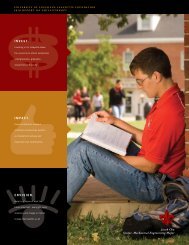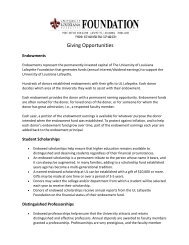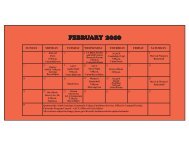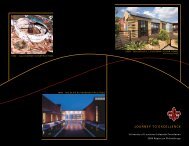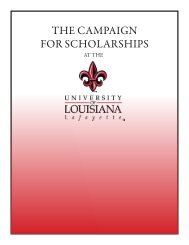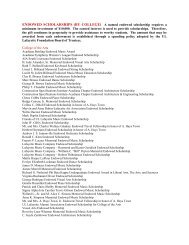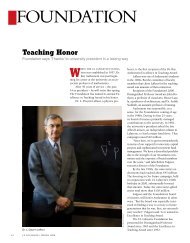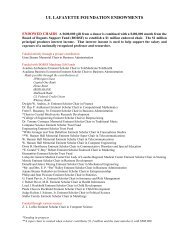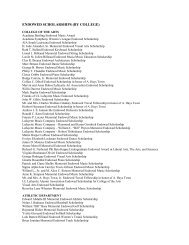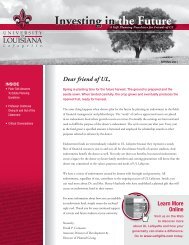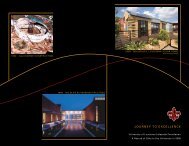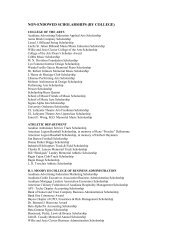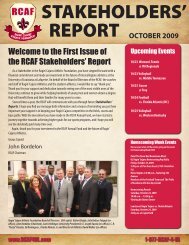INVEST. ENVISION. IMPACT. - UL Lafayette Foundation
INVEST. ENVISION. IMPACT. - UL Lafayette Foundation
INVEST. ENVISION. IMPACT. - UL Lafayette Foundation
You also want an ePaper? Increase the reach of your titles
YUMPU automatically turns print PDFs into web optimized ePapers that Google loves.
<strong>UL</strong> LAFAYETTE FOUNDATION & RESEARCH<br />
<strong>INVEST</strong>.<br />
Providing the resources and<br />
technology our faculty needs to<br />
compete with other universities<br />
for research dollars<br />
<strong>IMPACT</strong>.<br />
Researchers and professors<br />
are recognized on an international<br />
stage for their work<br />
<strong>ENVISION</strong>.<br />
<strong>UL</strong> <strong>Lafayette</strong> moves up in<br />
Carnegie Classifications from “High<br />
Research Activity” to “Very High<br />
Research Activity” with over<br />
$100 million in research dollars<br />
<strong>UL</strong> LAFAYETTE RESEARCH<br />
RESEARCH.LOUISIANA.EDU | 337.482.6541<br />
On April 20, 2010, the Deepwater Horizon drilling rig exploded in the<br />
Gulf of Mexico, approximately 50 miles off the Louisiana coastline,<br />
causing the largest oil spill in U.S. history. As oil began gushing into<br />
the Gulf, faculty and staff at <strong>UL</strong> <strong>Lafayette</strong> were quickly assessing how<br />
they could help in the recovery and response.<br />
The state quickly realized they needed access to university<br />
expertise. They created a 20 person panel entitled ‘Horizon Science<br />
and Engineering Review Team’ (HSERT) to provide technical input.<br />
Four researchers from the university including the Dean of the<br />
College of Engineering Dr. Mark Zappi, Engineering Professors<br />
Dr. Don Hayes and Dr. Ehab Meselhe and Associate Professor of<br />
Renewable Resources Dr. Jenneke Visser served on the panel making<br />
recommendations and sharing knowledge on response, remediation,<br />
and restoration.<br />
<strong>UL</strong> <strong>Lafayette</strong>’s Vice President for Research, Dr. Robert Twilley led<br />
the panel of university experts and Dean Zappi worked with the<br />
cleanup subcommittee. Zappi made recommendations, reviewed work<br />
plans, offered suggestions on meeting with federal officials and met<br />
with companies on behalf of the governor’s office. “At <strong>UL</strong> <strong>Lafayette</strong>,<br />
we have been studying the coastline for so long, our expertise<br />
was so valuable to everyone,” Zappi said. “Our role in the recovery<br />
and cleanup shows we are key players and that <strong>UL</strong> <strong>Lafayette</strong> is a<br />
top research institution.”<br />
When Governor Bobby Jindal activated the Louisiana Business<br />
Emergency Operation Center (BEOC), Ramesh Kolluru and the <strong>UL</strong><br />
<strong>Lafayette</strong> National Incident Management Systems and Advanced<br />
Technologies (NIMSAT) Institute got to work. They were tasked with<br />
presenting ideas on how to cap the well and remediate the coastal<br />
wetlands. They solicited ideas from the private sector and presented<br />
the best solutions to the appropriate agencies. “Often the individuals<br />
in the private sector are the ones directly impacted by the disaster,”<br />
Dr. Ramesh Kolluru, Executive Director of NIMSAT said. “By allowing<br />
them to contribute their ideas and solutions, we are helping them<br />
provide their services to government and as a result, may be helping<br />
them stay in business.” NIMSAT also is providing statistical analysis<br />
of the economic impact of the disaster itself and the deepwater<br />
drilling moratorium.<br />
The input of these faculty was just a small part of research being<br />
done by <strong>UL</strong> <strong>Lafayette</strong> employees. Researchers at the university<br />
received three National Science <strong>Foundation</strong> (NSF) grants to study the<br />
effects of the oil spill. Dr. Darryl Felder and Dr. Suzanne Fredericq<br />
received an $185,608 Rapid Response Research (RAPID) grant<br />
to visit banks and pinnacles where offshore seaweeds and macro<br />
crustaceans have previously been documented. Dr. Azmy Ackleh, Dr.<br />
Nabendu Pal and Dr. Natalia Sidorovskaia received a $912,197 RAPID<br />
grant to assess the immediate impact of the Deepwater Horizon oil<br />
spill on near by resident populations of endangered whale species.<br />
In addition, Dr. Bob Grambling of the Sociology Department is<br />
collaborating as a Co-Principal Investigator on a $57,306 NSF grant<br />
to study the impact of the media stories on the oil spill by<br />
completing a content analysis of the media accounting and designing<br />
and implementing a survey to measure residents’ understanding<br />
of the event.<br />
Shortly after the oil spill, BP announced a commitment of up to<br />
$600 million for the Gulf of Mexico Research Initiative (GRI) to study<br />
the impact of the Deepwater Horizon incident and its effects on the<br />
environment; as well as developing new technology in deepwater<br />
oil exploration. Dr. Twilley along with three other Louisiana university<br />
Vice Presidents/Vice Chancellors joined to develop an initiative<br />
named the Gulf Research Institute for a Resilient Louisiana (GRI-<br />
RL). GRI-RL will compete for the BP dollars to perform research.<br />
“We are excited about our universities working collaboratively to<br />
secure funding for research that will yield immediate short-term and<br />
medium-term solutions for the on-going remediation and recovery<br />
effort,” Twilley said. “We believe this will position Louisiana on<br />
a roadmap for strategic and long-term sustainable development.<br />
Obtaining even just a portion of these research dollars could make<br />
a huge impact on our university.”<br />
To learn more about research at <strong>UL</strong> <strong>Lafayette</strong>, please visit:<br />
http://research.louisiana.edu/<br />
UNIVERSITY OF LOUISIANA LAFAYETTE FOUNDATION | 9 |



